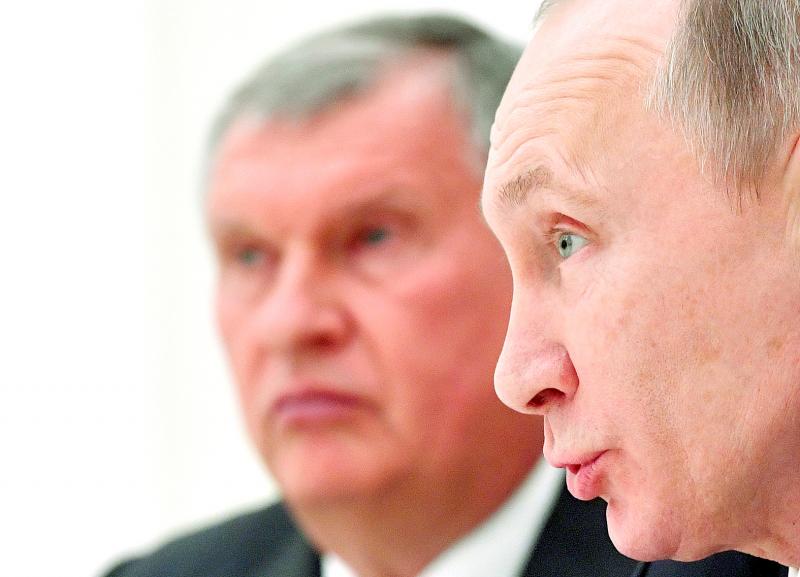Russian oil giant Rosneft, run by a close ally of Russian President Vladimir Putin, is wielding growing influence over the nation’s remaining independent media outlets, already squeezed by tightening press freedoms and pressure from the Kremlin.
Now, reporters at the country’s top liberal business daily Vedomosti — shaken in March by an announcement from owner Demyan Kudryavtsev that he planned to sell the newspaper — have denounced censorship under its new acting editor-in-chief, Andrei Shmarov, who was appointed in late March, ahead of the sale’s completion.
Journalists say they were barred from covering negative opinion polls of Putin, and that editors interfered in coverage of Rosneft.

Photo: AFP
On Friday, the new owner was announced as the head of a little-known regional news agency called FederalPress, Ivan Yeryomin.
An investigation last month by several Russian news outlets, including Vedomosti, revealed that Rosneft leveraged control over the paper through debts owed by Kudryavtsev to the oil giant’s bank.
Kudryavtsev denied these allegations; Rosneft has not reacted.
“The real owner is Rosneft through a chain of debt,” said Vedomosti editor-at-large Maxim Trudolyubov, who has worked at the paper since it started in 1999.
He said the new editor-in-chief was “selected to run the newspaper favorably to the new owner… They just wanted to silence it.”
He described Rosneft chief executive Igor Sechin as “some sort of a hitman” employing aggressive tactics.”
“He plays a complicated game of takeovers to build his empire at the expense of other oligarchs. It’s about assets, money, influence,” Trudolyubov said.
The newspaper wrote in a recent editorial: “Vedomosti will just become another dependent and controlled media outlet.”
On Friday, the paper wrote that the change of ownership deal undoubtedly had “not only commercial aims.”
Its editorial suggested that “unnamed figures who really stand behind the official buyers ... see the publication as an instrument of influence, not a business.”
“This is a public humiliation of the Vedomosti brand and its editorial staff,” Meduza news site editor-in-chief Galina Timchenko said.
Last month it was the turn of another respected business daily, RBK. Rosneft is suing the newspaper for a record 43 billion rubles (US$612 million) over an article about its activities in Venezuela.
“We aren’t worried, because we know our work is correct and honest,” said Timofei Dzyadko, an energy reporter at the paper.
However, RBK editor-in-chief Pyotr Kanayev said the lawsuit was surprising.
“We published [an] article based on public information and we’re not the source of this information,” he said, adding that RBK’s news coverage “doesn’t serve anybody’s interests, only our audience.”
A legal defeat against the oil giant would deal the media outlet a serious blow.
The two decades of Putin’s rule have seen all the national television channels as well as a number of radio stations and newspapers pass into the hands of Kremlin-friendly owners.
Vedomosti launched in September 1999 as Putin emerged as Russia’s dominant political figure.
The paper was cofounded and co-owned by Dutch entrepreneur Derk Sauer’s Independent Media, the Financial Times and the Wall Street Journal, demonstrating Russia’s entry into the fold of Western capitalist countries. It has changed hands several times since its first print run as lawmakers introduced new legislation limiting foreign ownership of Russian media.

Brazil, the world’s largest Roman Catholic country, saw its Catholic population decline further in 2022, while evangelical Christians and those with no religion continued to rise, census data released on Friday by the Brazilian Institute of Geography and Statistics (IBGE) showed. The census indicated that Brazil had 100.2 million Roman Catholics in 2022, accounting for 56.7 percent of the population, down from 65.1 percent or 105.4 million recorded in the 2010 census. Meanwhile, the share of evangelical Christians rose to 26.9 percent last year, up from 21.6 percent in 2010, adding 12 million followers to reach 47.4 million — the highest figure

A Chinese scientist was arrested while arriving in the US at Detroit airport, the second case in days involving the alleged smuggling of biological material, authorities said on Monday. The scientist is accused of shipping biological material months ago to staff at a laboratory at the University of Michigan. The FBI, in a court filing, described it as material related to certain worms and requires a government permit. “The guidelines for importing biological materials into the US for research purposes are stringent, but clear, and actions like this undermine the legitimate work of other visiting scholars,” said John Nowak, who leads field

‘THE RED LINE’: Colombian President Gustavo Petro promised a thorough probe into the attack on the senator, who had announced his presidential bid in March Colombian Senator Miguel Uribe Turbay, a possible candidate in the country’s presidential election next year, was shot and wounded at a campaign rally in Bogota on Saturday, authorities said. His conservative Democratic Center party released a statement calling it “an unacceptable act of violence.” The attack took place in a park in the Fontibon neighborhood when armed assailants shot him from behind, said the right-wing Democratic Center, which was the party of former Colombian president Alvaro Uribe. The men are not related. Images circulating on social media showed Uribe Turbay, 39, covered in blood being held by several people. The Santa Fe Foundation

NUCLEAR WARNING: Elites are carelessly fomenting fear and tensions between nuclear powers, perhaps because they have access to shelters, Tulsi Gabbard said After a trip to Hiroshima, US Director of National Intelligence Tulsi Gabbard on Tuesday warned that “warmongers” were pushing the world to the brink of nuclear war. Gabbard did not specify her concerns. Gabbard posted on social media a video of grisly footage from the world’s first nuclear attack and of her staring reflectively at the Hiroshima Peace Memorial. On Aug. 6, 1945, the US obliterated Hiroshima, killing 140,000 people in the explosion and by the end of the year from the uranium bomb’s effects. Three days later, a US plane dropped a plutonium bomb on Nagasaki, leaving abut 74,000 people dead by the